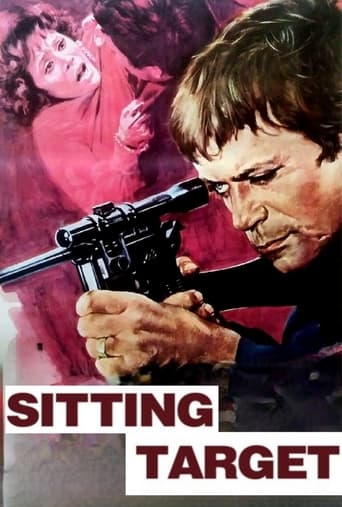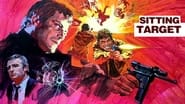lost-in-limbo
The British sure knew how to deliver gut-punching, bittersweet crime- thrillers in the 70s and "Sitting Target" easily ranks up there as one the best. Convicted killer Harry Lomart and his fellow inmate Birdy Williams break out of prison, where Harry only has one thing on mind. To exterminate his unfaithful wife who before breaking out asked for a divorce, since she met someone else, was pregnant and couldn't wait any longer for Harry to serve his time. Harry and Birdy plan out their actions and go about trying to get some money of their former criminal partners. Also on their trail is police inspector Milton, who originally caught Harry and is determined to protect the hunted woman. At heart the focused plot (adapted from Laurence Henderson's novel) is a simple, but well done revenge story fuelled on by Oliver Reed's assertively grim and snarling performance. It's a turn of torment, but lusting with aggression as Reed goes about his dogged, unpleasant business. Working alongside him is the outstanding Ian McShane. He brings a certain smarmy and self-assured presence that calculatedly fits, which makes his character somewhat hard to read. The combination between the two was very dependable and the relationship believable which makes the fanatical twist very hard-hitting as things are not quite what they seem, although it's not that unforeseeable. The drama then thickens leading to a furious climax. Jill St. John is splendid as Harry's wife and a steadfast Edward Woodward makes the most of his straight-up police inspector role. Also making appearances are Frank Finley, Freddie Jones, Robert Beatty and the ever enticing Jill Townsend. Director Douglas Hickox brings to the table a stark, harsh reality with its rough violence, gritty London locations and compact pacing. There's plenty of character drama stemming from its tough, but distinct script that when it came to the short bursts of action (which is carefully placed and orchestrated), it does pack a wallop on the emotional front, as you feel every last drop. Innovative camera angles stem from Edward Scaife's cinematography of a brooding backdrop and Stanley Myers' magnificent music score is truly baiting in its unhinged instrumental tones. "Sitting Target" is a raw, no-bull revenge yarn with many striking contributions. "We're doing everything together, like always".
James Hitchcock
The main character in "Sitting Target" is Harry Lomart, a convict serving a lengthy jail term, who learns that his attractive young wife Pat has not only cheated on him with another man but is also expecting that man's baby. Lomart, infuriated, swears revenge; together with another inmate, Birdy, he breaks out of jail with the intention of killing Pat and her lover before fleeing the country.The film has some similarities with another British crime drama from the early seventies, "Get Carter", which came out the previous year. Both are gritty gangster dramas with a revenge theme, concentrating on the criminals themselves rather than on the police's fight against crime. In films like this there is no honour among thieves; one gangster's worst enemy is often another gangster rather than a policemen. In keeping with the permissive ethos of the era both films treat violence graphically, far more graphically than would have been permitted only a decade earlier. Both were shot on location ("Get Carter" in the North-East, "Sitting Target" in South London) and have a strong sense of place. And yet, unlike another reviewer, I cannot but find myself in agreement with those who have characterised "Sitting Target"as a poor man's "Get Carter".Not all the acting is particularly good, especially from the former Bond girl Jill St John who seems miscast as Pat. (This was her first film after "Diamonds are Forever"; presumably the producers felt they needed a big-name American star to help with overseas sales). Like a number of foreign, especially American, actors, she makes the mistake of assuming that all British people speak with the same "posh" accent and that mastering this accent is all one needs to do in order to portray a British character convincingly, regardless of social background. (Others who have fallen into the same trap include Natalie Portman in "V for Vendetta" and even Meryl Streep in "The French Lieutenant's Woman"). Jill might have done better to drop the accent altogether; it is far more conceivable that a South London villain might have married an American girl than that he might have married a Roedean-educated débutante, which is what she sounds like here.Oliver Reed is better; although his Lomart may lack the depth of some of his other performances from this period, such as his Grandier in Ken Russell's "The Devils", he does at least make the character convincingly thuggish, a man whose every move is driven by anger and resentment. Unlike Michael Caine's Jack Carter, who hides his violent nature beneath a veneer of stylish sophistication, with Lomart what you see is what you get. There is nothing stylish or sophisticated about him.The film moves along at a swift pace, although it does perhaps get over-complicated in the second half, as it becomes progressively more violent and moves towards an explosive finale. It never, however, achieves the depth or significance of "Get Carter", a sort of anti-"Godfather" which demythologises the criminal lifestyle. "Sitting Target", by contrast is a brutal and nasty crime thriller, if occasionally an effective one, exploiting the violence it purports to condemn. 5/10
shepardjessica
With a gossamer wing-span, this curiosity from the early 70's is a quirky hybrid of Demetrius and the Gladiators versus Darker than Amer. Flight of fancy aside, the determination of this director JUST TO GET THIS RELEASED must have been mind-boggling. Without Jill St. John as his muse, Mr. O. Reed would have canoed upstream without his proverbial paddle.Shocking one instant, lovingly discerning the next, this mild upgrade of post-War alienation seems to say escape is all there is for this Bluto-type force of nature with plenty of rope on hand. He just won't give up his sense of "Come and get me, (warden, coppers)"! He's there when he needs to be or so it seems. Justice is a foreign word when bad haircuts and razor-thin wit run the terrain. References to St. Matthew would hardly seem out of order. Tough and grinding like a Mac Truck. A relentless 8 out of 10 for a special "action" flick. Reminiscent of Get Carter, but a bit more brutal on the senses. Highly recommended
John Seal
Oliver Reed breaks out of prison intending to top his wife, Susan St. James, whom he suspects of cheating. A good cast can't redeem this trudge through the London underworld. Stanley Myer's outstanding score is the film's only redeeming value.





